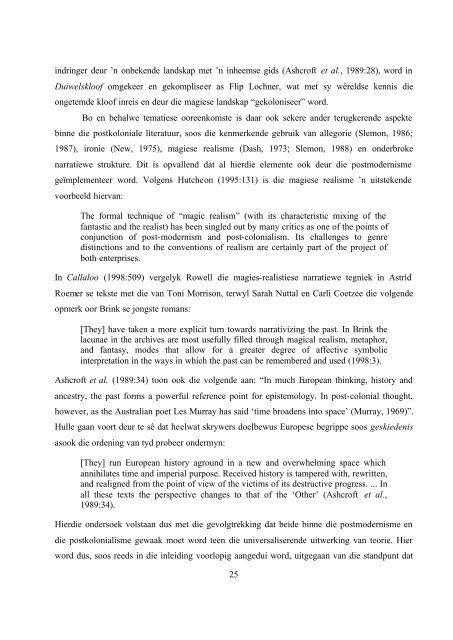POTGIETER-MA-TR02-81.pdf
POTGIETER-MA-TR02-81.pdf
POTGIETER-MA-TR02-81.pdf
Create successful ePaper yourself
Turn your PDF publications into a flip-book with our unique Google optimized e-Paper software.
indringer deur ’n onbekende landskap met ’n inheemse gids (Ashcroft et al., 1989:28), word in<br />
Duiwelskloof omgekeer en gekompliseer as Flip Lochner, wat met sy wêreldse kennis die<br />
ongetemde kloof inreis en deur die magiese landskap “gekoloniseer” word.<br />
Bo en behalwe tematiese ooreenkomste is daar ook sekere ander terugkerende aspekte<br />
binne die postkoloniale literatuur, soos die kenmerkende gebruik van allegorie (Slemon, 1986;<br />
1987), ironie (New, 1975), magiese realisme (Dash, 1973; Slemon, 1988) en onderbroke<br />
narratiewe strukture. Dit is opvallend dat al hierdie elemente ook deur die postmodernisme<br />
geïmplementeer word. Volgens Hutcheon (1995:131) is die magiese realisme ’n uitstekende<br />
voorbeeld hiervan:<br />
The formal technique of “magic realism” (with its characteristic mixing of the<br />
fantastic and the realist) has been singled out by many critics as one of the points of<br />
conjunction of post-modernism and post-colonialism. Its challenges to genre<br />
distinctions and to the conventions of realism are certainly part of the project of<br />
both enterprises.<br />
In Callaloo (1998:509) vergelyk Rowell die magies-realistiese narratiewe tegniek in Astrid<br />
Roemer se tekste met die van Toni Morrison, terwyl Sarah Nuttal en Carli Coetzee die volgende<br />
opmerk oor Brink se jongste romans:<br />
[They] have taken a more explicit turn towards narrativizing the past. In Brink the<br />
lacunae in the archives are most usefully filled through magical realism, metaphor,<br />
and fantasy, modes that allow for a greater degree of affective symbolic<br />
interpretation in the ways in which the past can be remembered and used (1998:3).<br />
Ashcroft et al. (1989:34) toon ook die volgende aan: “In much European thinking, history and<br />
ancestry, the past forms a powerful reference point for epistemology. In post-colonial thought,<br />
however, as the Australian poet Les Murray has said ‘time broadens into space’ (Murray, 1969)”.<br />
Hulle gaan voort deur te sê dat heelwat skrywers doelbewus Europese begrippe soos geskiedenis<br />
asook die ordening van tyd probeer ondermyn:<br />
[They] run European history aground in a new and overwhelming space which<br />
annihilates time and imperial purpose. Received history is tampered with, rewritten,<br />
and realigned from the point of view of the victims of its destructive progress. ... In<br />
all these texts the perspective changes to that of the ‘Other’ (Ashcroft et al.,<br />
1989:34).<br />
Hierdie ondersoek volstaan dus met die gevolgtrekking dat beide binne die postmodernisme en<br />
die postkolonialisme gewaak moet word teen die universaliserende uitwerking van teorie. Hier<br />
word dus, soos reeds in die inleiding voorlopig aangedui word, uitgegaan van die standpunt dat<br />
25

















